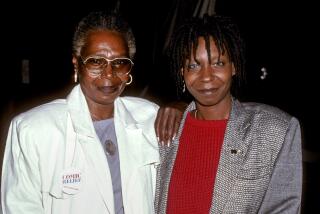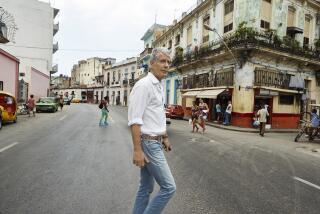Ode to an Emerald Greenhouse : THE VILLAGE OF LONGING AND DANCEHALL DAYS <i> by George O’Brien (Viking: $18.95; 325 pp.) </i>
We all meet young people who seem out of place, awkward, ingratiating and sullen by turns, fanciful, filled with barely concealed yearnings neither we nor the world can fulfill. And we so ache for them, for the intense projectiles of their hopes, for the abysses of their despairs, that we almost say: “Be prudent and just a little cynical. Yes, there are pleasures and successes to be had, but nothing will quite turn out as you expect. Nothing.” In the end, we say very little, for we know (from our own excesses of hope and despair) that David with his nimble slingshot would never have listened to Ecclesiastes--not until he was old enough to write those sad, sane, arthritic reflections himself.
George O’Brien, a middle-age Irishman who lives and teaches in the United States (first at Vassar, now at Georgetown), has written two books of autobiography, here collected in one volume, about the pain of youthful adjustment from aspiration to reality. These are beautifully realized texts, full of delicately observed detail, in which all the parts fit together into seemingly seamless, balanced, feather-light wholes. One might wish for better proofreading (there are typos, antic orthographies, senseless Latin phrases), but not better writing. Here are sentences, paragraphs, sequences that will bring immense satisfaction to anyone who cares about written English.
O’Brien grew up in Lismore, which happens to be in County Waterford but is indistinguishable from most of Ireland’s gray villages. Not, however, to its natives. “We felt wonderfully superior,” writes O’Brien. “Lismore was the place to live. ‘Dungarvan is the pisspot of Ireland and Abbeyside the handle,’ we’d say; and, ‘Tallow: the last place God made, and forgot to finish’; and when a thing was crooked it was ‘all to one side, like the town of Fermoy.’ Better Lismore than any of those places, was the widely shared sentiment. But within Lismore, who was at peace, who felt unyearningly at home? Nobody I knew.”
Like brutalized children who stick by their thuggish parents no matter what else is offered, Irish villagers grow up with the conviction, despite all evidence to the contrary, that their little bit of turf is the only place to be and their family name the only one to carry. It is a sentiment far more ancient than Ireland’s recently discovered nationalism, more limiting even than a proper tribalism.
The pre-Christian Irish employed a (so far as I know) unique social practice called fosterage, whereby no one brought up his/her own children but placed each child, soon after birth, with another household. The natural parents would then, in their turn, receive and raise to maturity other people’s children. This may have been the only way, given the high-intensity Irish sense of family, to forge extra-familial bonds strong enough to keep the society from degenerating into armed farmsteads and wholesale incest.
The Lismore O’Briens are no exception to the imploding hothouse of Irish family life. The household’s inmates--Mam; her grown children, the beloved Chrissy and Geo; her small grandson, the author--behave toward one another more like maladjusted, oversexed lovers than like family members. (Is there anything cool about the Irish?) When Mam heatedly (how else?) tells a visitor that if her own keenly athletic sons were ever to play any “foreign game” (such as rugby or soccer) she would “show ‘em the door,” the visitor replies: “By gor, you’re a hard woman.”
“And she certainly looked it,” observes O’Brien. “Her face was as sheer and obdurate as steel, and as unflinching. It was a face that didn’t have another cheek to turn. A face that was a prayer of dedication to the one true cause, to the only cause that had ever won through. Uncompromising, exalted, vindictive, extreme. Irish.”
Before long, Aunt Chrissy and Uncle Geo have fled. All they really do is get married and attempt to live their own lives. And so, they are never heard from again. “So lives go through their unforeseeable, appointed rounds, lured ineluctably through the ordeal of love in exile via the ordeal of lovelessness at home,” comments the author. “No doubt there was much more going on then than I was aware of, more perhaps than even the participants themselves could handle properly.
“Who can say what’s buried in the lives of people?--not the people themselves. They simply reach an awful point at which nothing more can be said. Then action blunders in, singular and irretrievable. Yet in its wake, a deeper silence wells for which a gloss must needs be found if all is not to be lost, if all lives are not to be spoken of as the unexceptional means of rage and need, if the only version of seriousness is not to be extremism, the quelled world of silence that follows explosions.”
It is the author’s turn to leave next--first for school, and then for Dublin and his widowed father, the companionable dream of all his childhood. But the father has remarried and young Seoirse (SHORE-sha, the Irish form of George, by which the author was called in those days) cannot abide being a mere resident, not the center, of the new household. He more than halfway sides with Mam, for whom her son’s second marriage is a mortal betrayal.
The new wife, Kay, is a Dubliner from Prussia Street. “Da and Kay had sinned against pattern. They had committed change, and had (oh horrid hubris) assumed they were free to do so. They had caused thought. Proud things--they won’t have luck! And as to her . . . was she so shamelessly imbued with the Dublin looseness of Prussia Street that she was sufficiently freeborn never to consider the very existence of psychic property rights?”
Dublin proves to be not the city of hope that Seoirse had dreamed of but a terrain of transition--from narrow Lismore to England and a wider world. Along the way, throughout the course of his sweetly inebriate itinerary (for this is a true romance, a travelogue kindred to “Tom Jones,” “The Pickwick Papers” and other “road” books), O’Brien flings out insights with the easy magnanimity of a prosperous tippler buying rounds of drinks.
Respectability: “a door that stayed shut, no matter how clamant the visitors.” The telephone: “the weapon of choice for the genteel ambush.” Masturbation: “I was reduced to a bone, the bone that pointed arrogantly at nothing, the miniature ‘I’ that dominated a father who only wanted to reject it, who beat it till it cried.” The arrival of the Elizabethans: “They sailed in clear and free. No people. If the forests harboured natives, they showed no sign. The land existed in a state of perfect integrity: aqueous, unmoving, arboreal, silent. A cathedral, a queen, a virgin. Like the James River, the Charles River, Potomac, Hudson--the penetrations without number later on. And it so little resembled property, being undefended. The urge to possess it, to seize it like a treasure, to treasure it so jealously that power became the sole metaphysics of occupancy. . . .”
Of course, it all ends badly. Both the old invaders’ and young Seoirse’s dreams. No nation loves its children better, nor hates its adolescents more than Ireland, which scarcely leaves room for adulthood at all. I sometimes think that, of all Western people, the Irish are best fashioned to the discovery of the disjunction between life’s promises and its fruits.
Following hard on the assassination of America’s one identifiably Irish president (whom O’Brien calls the “uncrowned king”), the Irish-American sociologist Daniel Patrick Moynihan articulated a generation’s loss of innocence, ardor and idealism by remarking (in reply to someone who said, “We will never laugh again”): “Oh, we’ll laugh again, but we’ll never be young again.” In that same aftermath, Moynihan offered this definition: “To be Irish is to know that in the end the world will break your heart.”
Did Kennedy know this? Does it explain the diffidence, the essential conservatism that lurked behind his liberalism? Can life for the Irish ever be anything but tragedy?
More to Read
Sign up for our Book Club newsletter
Get the latest news, events and more from the Los Angeles Times Book Club, and help us get L.A. reading and talking.
You may occasionally receive promotional content from the Los Angeles Times.






